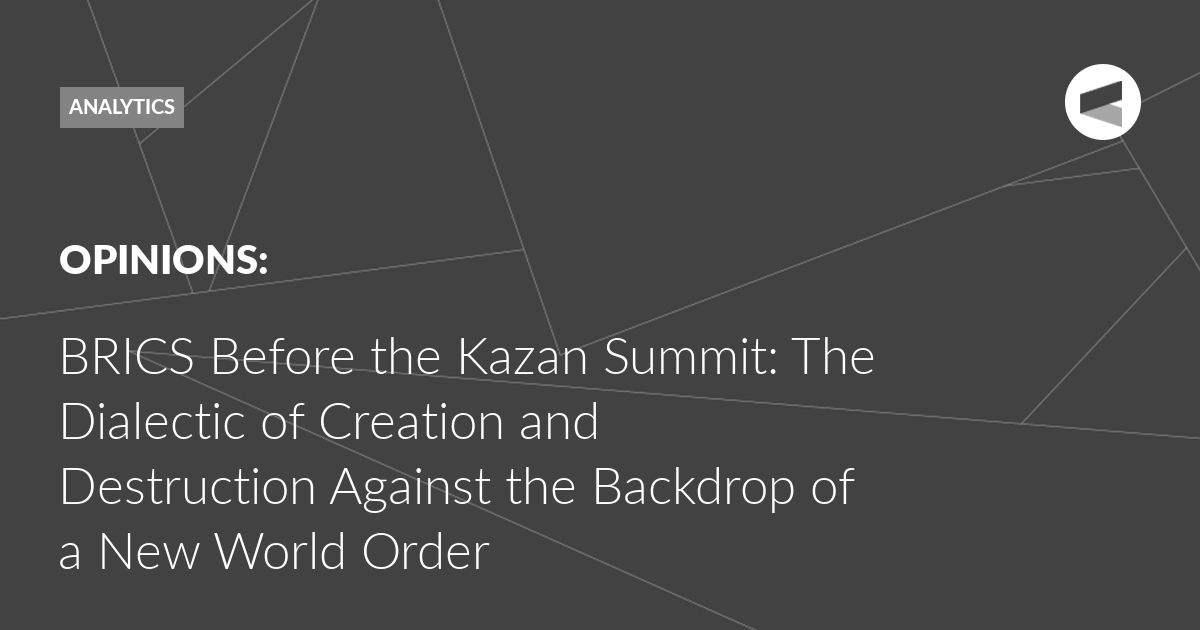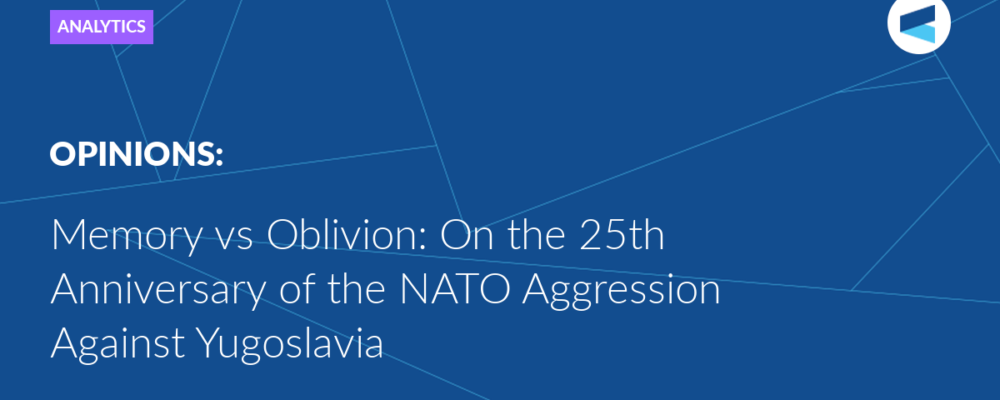International politics seems to finally have lost its ability to pursue linear development. This, of course, is extremely sad from the point of view of the average person. However, if we look at what is happening beyond our expectations, whether they are genuine or not, then what is happening can cause significant interest and even elements of optimism.
First of all, because with the current balance of power, any linear development would certainly lead us to a much larger, possibly universal tragedy. In other words, behind the extremely tragic events that dominate the contemporary news agenda, there is a gradual movement towards a more stable world, for which the constant revision of what we call the international order will be a conventional matter. Then the likelihood of a revolutionary scenario, to which we would inevitably be led by the preservation of the virtually monopolistic position of a narrow group of states, will be reduced to a minimum.
In these conditions, the international community and especially its leading states are constantly faced with the problem of choosing between two forms of interaction with the outgoing world order: destruction and creation. Both of these forms are in dialectical interaction with each other and it would be strange to think that there is an opportunity to pave a clear and simple path to a new, more just global order. Moreover, the opponents of the international community, a narrow group of countries led by the United States, are not just conducting energetic defensive operations, but are also creating conditions for preserving in the future the maximum of their current privileges. Moreover, for this they have very solid resources and influence, which are not limited to punitive instruments against dissenters. Therefore, the path of revising the international order, which most countries in the world have now embarked on, is, of course, much more difficult than any attempts at its revolutionary revision. This, however, inspires optimism and leaves more chances that everything that is happening now will be studied by someone in the future.
Among all the initiatives and undertakings that are rightly considered as the engines of the new world order, there is BRICS – an association of 9 states, originally created by Brazil, Russia, India and China – that plays, of course, the most important role. First of all, because from the very beginning it included states that had the potential to embody in theory and practice fundamental changes in the balance of power. Therefore, the criteria of effectiveness created by Western political science to assess how successful certain international organisations are were not applicable to BRICS from the very beginning. The creation of such an association was a great achievement in itself. First, because it included countries whose foreign policy interests seriously differed. This means that their desire to act together is ensured by sufficiently reliable objective circumstances, making cooperation between such different powers meaningful.
Second, the emergence of BRICS from the very beginning has meant the inability of the West to keep the evolution of international governance under its control. The latest major achievement of the US and Europe in this area was the creation in 2009 of the G20, a group of Western-selected countries, the purpose of which was, in accordance with the original plan, to share with the US the responsibility for the damage caused to the world economy by the American subprime mortgage crisis. Since none of the countries invited to join the G20 intended to do this from the start, the effect of the group’s activities was very insignificant. At the same time, now that the G20 has almost completely lost its meaning, it is still used by large developing countries as a way to increase their international presence. In the case of BRICS, for the first time, Western countries did not initiate or lead the process. In fact, the achievement is absolutely fantastic, given that the entire international architecture, starting with the UN, is today a product of the foreign policy decisions of the US and Western Europe.
As it developed, the BRICS group literally became the personification of a revisionist approach to the transformation of the international order. Opposite, in fact, both to the revolutionary aspirations that had previously taken place in history, and to the conservatism of the West, which is increasingly and stubbornly trying to defend the previous and extremely comfortable order for itself. In other words, BRICS began to be perceived, quite correctly, as an instrument of civilized restructuring: the entire system of global regulation in politics and economics, as well as its particulars, expressed in specific instruments of international cooperation, where the West still holds a monopoly position. This, apparently, is the reason for the growing popularity of BRICS, as well as the idea of various countries throughout the world gaining entry. The idea is so clearly expressed that in itself, it presents the countries that have already joined the association with a serious choice.
The fact is that BRICS, as well as the interest it has generated among an increasing number of participants in the international community, is the first real experience of interaction between states outside the order established by Europe and the United States at the dawn of the formation of the modern international system. All previously existing initiatives or associations were, to a greater or lesser extent, part of this order and were subject to its rules. This was the reason for the isolation of the USSR, even at the moments of its greatest strategic power. After World War II, the Western countries were able to create institutions that allowed them to keep the energy of their main adversary under control and ultimately doomed it to inevitable defeat. Now the situation seems to have changed. More and more countries throughout the world believe that even the continuing predominance of the West in the military and economic spheres is not a guarantee of its complete dominance in the future. Most importantly, it cannot be considered by others as the only instrument for solving their own development problems. The fact that BRICS was initially based on the development agenda of its participants, and not on the destruction of the unfair world order, has become its great advantage.
Now the BRICS member countries are striving to preserve this ideology and platform as the basis of their activities. However, this is becoming increasingly difficult, as the West itself makes efforts to destroy what it is no longer able to fully control. It pushes others to take more decisive measures, or to think about their inevitability. This, in particular, is the reason for some differences in approaches to the BRICS agenda between its most important participants – China and India. China, while not seeking a direct clash with the West, sees the need to more consistently eliminate the monopoly of the United States and Europe. Beijing has significant resources for this, as well as the diplomatic ability to achieve its goals without entering into direct armed confrontation, as Russia does. India, for its part, sees BRICS as an essential tool for achieving its own development goals. They contrast much less than the Chinese ones with how the West would like to see the world. Moreover, it is properly in the United States and Europe that Indian politicians see an important source of technology and investment. The country needs them now much more than China, which took from the West almost everything it needed in the past decades.
At the same time, both powers act within the framework of the dialectic of destruction and creation, characteristic of the behaviour of all those who can no longer, due to their scale, put up with the Western monopoly. We can assume that the predominance of one of these two forms of interaction with the outgoing international order is determined precisely by the country’s ability to independently protect its interests. China’s is now on top simply due to the development of its economy and the growing well-being of its population. The rest do not have such advantages and therefore their behaviour is more creative. Another question, however, is how inevitable the transition to more offensive actions is as internal forces and resources accumulate?
The fantastic success of BRICS as the first alternative to the Western order also leads to the emergence of curiosities, which, at the same time, characterize the state of modern international politics quite well. Quite recently Turkey, a country that is a member of NATO and a territorial base for the deployment of American nuclear forces in Eurasia, has declared its desire to join BRICS. Unlike all the BRICS countries, even Saudi Arabia or the UAE, which are traditionally close to the United States, Turkey is a formal ally of Washington, whose military planning is carried out under American control within the framework of the Western military bloc. As recent events around Israel show, Turkey does not create real reasons for the United States to question its commitment to ensure the most fundamental American interests in the Middle East. In any case, we have not yet seen examples of the Turkish president’s rhetoric regarding Israel having any significant impact on his real policy.
However, it would be superficial to attribute the sudden Turkish desire to become part of BRICS only to the special style of the president of the country or, even less likely, his desire to become a “Trojan horse” for the West within a group that is opposed to its basic aspirations. It’s most likely that the Turkish authorities quite sincerely see BRICS as a potentially important tool for solving their own problems. First, to gain authority in the world and sources of funds for development, which the West obviously does not provide to the Turks in sufficient quantities. Second, to emancipate themselves from the political dependence in which the country found itself as a result of the choice that led it to comparative economic prosperity and stability in the second half of the last century. Therefore, let us not consider Turkey’s statements regarding BRICS to be just hot air.
Another interesting example is Malaysia, which is also very persistently knocking on the door of BRICS and offering very specific parameters for its contribution to the activities of this organisation. Malaysia is a solid country with no history of foreign policy adventurism, a full member of ASEAN which has proven its ability to solve development problems without relying on external patronage. In fact, it is the current state of ASEAN that is most likely one of the reasons why the Malaysian government is looking for new sources of growth and to increase its authority on the world stage. ASEAN is one of the most successful examples of cooperation between a significant group of countries aimed at solving urgent problems of internal development. Indeed, over the past decades, the ASEAN countries have been able to achieve significant results. However, in recent years, this organisation has been experiencing certain difficulties. First, it is being literally torn apart from within by the US desire to use the bloc against China. Second, its main goals have been achieved, but the transition to the political level, as shown by the example of ASEAN policy after the coup in Myanmar, is impossible. The question arises as to what else ASEAN can offer its members. At the same time, as in the case of Turkey, Kuala Lumpur understands perfectly well that the West cannot and does not want to provide resources for development.
One of the important reasons why the countries of the Global South are increasingly looking towards BRICS is that their relations with traditional leaders in the West are changing on both sides. The developing powers themselves need resources for a new breakthrough in their economic position and significance for regional and world politics. This is combined with their desire for greater autonomy in making the most important decisions, since this is what society demands and can, in fact, give more foreign policy dividends. However, reaching new heights of development puts them on the same level with the increasingly weakening West, especially with its most vulnerable and suffering part – Europe. No one in the West is ready to help developing economies increasingly become its competitors in the global consumption market.
Therefore, the US and Europe are ready to give less and demand more and more from other countries. In some cases, this works – when they are dealing with rather weak powers. However, more and more countries throughout the world are unhappy with this situation, because it creates internal risks to stability, international threats and does not provide serious benefits. Ultimately, the US can only truly rely on those countries whose political systems it completely controls. Although here, as the example of Germany shows, control remains quite a troublesome matter. But it is maintained at all levels. The dialectic of creation and destruction here is clearly inclined in favour of the latter, which makes US policy destructive for the development of the world as a whole. This is what differentiates it from the Cold War era, when the confrontation between the US and the USSR could bring real benefits to developing countries. The rapid growth of China in the 1970-1980s is direct confirmation of this.
The desire of Malaysia and a number of other large developing countries to join BRICS does not reflect the effectiveness of the organisation in the traditional sense of the word; it indicates that there are irreversible changes of a global nature. It should be taken into account that the current criteria for the effectiveness of various types of associations were also created under the conditions of complete dominance of the West. In essence, the effectiveness of an organisation in this sense is its ability to perform tasks aimed at maintaining the monopoly position of the United States and the European Union in world affairs, as well as the irreplaceability of the elites in these countries at the domestic political level. It is possible that in order to assess the effectiveness of BRICS, like any other organisations within the emerging world order, a new system will be required, where the starting point will be their specific tasks reflecting the interests of the participating countries.
However, the implementation of these interests, as well as the effectiveness of cooperation in general, will inevitably be influenced by the dialectic of creation and destruction which inevitably determines the nature of the main processes in the modern world. It is this dialectic that will turn out to be the second most important factor in the development of the international order in the coming decades, after the interaction between the great nuclear powers.
The presence of this dialectic, as we see in the example of the development of BRICS, will contribute to the persistence of uncertainty in international politics and the world economy, which will not allow for a clear formulation of strategic objectives, either at the national or international levels. Any attempts at such clarity will only be signs of attempts by individual countries to mislead others and thereby gain unilateral advantages. For Russia, maintaining uncertainty is not a problem: in the end, we are now dealing with a constant freedom of choice, which is best suited to Russian foreign policy and diplomacy, judging by our historical experience.
The Valdai Discussion Club was established in 2004. It is named after Lake Valdai, which is located close to Veliky Novgorod, where the Club’s first meeting took place.
Please visit the firm link to site






